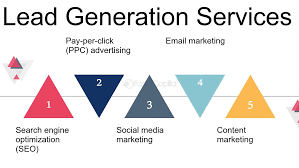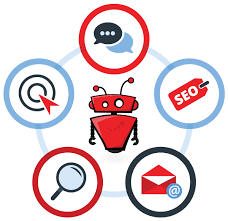Online Marketing Services for Small Businesses: Boosting Your Digital Presence
In today’s digital age, having a strong online presence is crucial for the success of any small business. With more and more consumers turning to the internet to research products and services, it has become essential for small businesses to invest in effective online marketing strategies. Fortunately, there are a variety of online marketing services available that can help small businesses thrive in the digital landscape.
Search Engine Optimization (SEO)
Search Engine Optimization, or SEO, is a fundamental component of any successful online marketing strategy. SEO involves optimizing your website and its content to rank higher in search engine results pages. By implementing relevant keywords, improving website speed and user experience, and building high-quality backlinks, SEO helps drive organic traffic to your website. This increased visibility can lead to more potential customers discovering your business and ultimately result in higher conversion rates.
Pay-Per-Click (PPC) Advertising
PPC advertising is another effective online marketing service that can provide immediate results for small businesses. With PPC campaigns, you only pay when someone clicks on your ad. Platforms like Google Ads allow you to target specific keywords and demographics to reach your desired audience. This targeted approach ensures that your ads are being shown to users who are actively searching for products or services similar to what your business offers.
Social Media Marketing
Social media platforms have become powerful tools for small businesses to connect with their target audience. With billions of active users worldwide, platforms like Facebook, Instagram, Twitter, and LinkedIn offer opportunities for businesses to engage with customers on a personal level. Social media marketing services help small businesses create compelling content, manage their social media accounts effectively, run targeted ad campaigns, and analyze performance metrics. By utilizing social media marketing strategies, small businesses can build brand awareness, foster customer loyalty, and drive traffic to their websites.
Content Marketing
Creating high-quality content is essential for establishing credibility and attracting potential customers online. Content marketing services help small businesses develop engaging and informative content, such as blog posts, articles, videos, and infographics. By consistently producing valuable content that addresses the needs and interests of your target audience, you can position your business as an industry expert and build trust with potential customers. Content marketing also plays a crucial role in improving SEO rankings and driving organic traffic to your website.
Email Marketing
Email marketing remains one of the most effective ways to reach and engage with your existing customer base. By sending targeted and personalized emails, small businesses can nurture relationships with customers, promote new products or services, offer exclusive discounts or deals, and drive repeat business. Email marketing services provide tools for creating visually appealing email templates, managing contact lists, tracking email campaign performance, and automating follow-up sequences.
In conclusion, online marketing services offer small businesses a wide range of opportunities to enhance their digital presence and reach their target audience effectively. Whether it’s through SEO strategies to improve search engine rankings, PPC advertising for immediate results, social media marketing for brand engagement, content marketing for credibility building or email marketing for customer retention – each service plays a unique role in helping small businesses thrive in the competitive online landscape. By investing in these services wisely and tailoring them to their specific needs, small businesses can unlock the full potential of the digital world and achieve long-term success.
5 Essential Tips for Small Businesses: Mastering Online Marketing Services
- Develop a comprehensive digital marketing plan
- Utilize social media platforms
- Leverage SEO strategies
- Invest in paid advertising
- Track results and adjust accordingly
Develop a comprehensive digital marketing plan
Develop a Comprehensive Digital Marketing Plan: Setting Your Small Business Up for Success
In today’s digital age, having a strong online presence is vital for the success of any small business. However, simply having a website or social media accounts is not enough. To maximize your online potential and effectively reach your target audience, it is crucial to develop a comprehensive digital marketing plan.
A digital marketing plan serves as a roadmap that outlines your business goals and the strategies you will employ to achieve them. It provides a clear direction and helps you stay focused on your objectives while navigating the ever-evolving digital landscape. Here are some key steps to consider when developing your plan:
- Define Your Goals: Start by identifying what you want to achieve with your digital marketing efforts. Whether it’s increasing brand awareness, driving website traffic, generating leads, or boosting sales, clearly define your goals so that all subsequent strategies can align with them.
- Know Your Target Audience: Understanding your target audience is crucial for effective marketing. Conduct market research to identify their demographics, interests, online behaviors, and pain points. This information will help you tailor your messaging and select the most appropriate platforms to reach and engage with them.
- Choose the Right Channels: With numerous digital marketing channels available, it’s important to select the ones that align with your target audience and business objectives. Consider utilizing search engine optimization (SEO) techniques to improve organic visibility on search engines or invest in pay-per-click (PPC) advertising for immediate results. Social media platforms like Facebook, Instagram, LinkedIn, or Twitter can help you connect directly with customers while content marketing through blogs or videos can establish credibility and attract organic traffic.
- Craft Engaging Content: Content is king in the digital world. Develop compelling and valuable content that resonates with your target audience. This includes blog posts, articles, videos, infographics, social media posts – anything that educates or entertains your audience while promoting your brand. Consistency is key, so create a content calendar and plan ahead to maintain a regular posting schedule.
- Monitor and Analyze: Implement tools to track the performance of your digital marketing efforts. Analyze metrics such as website traffic, engagement rates, conversion rates, and return on investment (ROI). This data will help you understand what strategies are working well and where adjustments need to be made.
- Adapt and Evolve: The digital landscape is constantly evolving, so it’s important to stay agile and adapt your strategies accordingly. Keep up with industry trends, emerging technologies, and changes in consumer behavior. Regularly review and update your digital marketing plan to ensure it remains effective in reaching your goals.
By developing a comprehensive digital marketing plan, small businesses can effectively navigate the online world and set themselves up for success. It provides a strategic framework that aligns with business objectives, identifies target audiences, selects appropriate channels, creates engaging content, monitors performance, and adapts to changing circumstances. With a well-defined plan in place, small businesses can confidently leverage the power of digital marketing to grow their brand presence, attract new customers, and achieve long-term success in the competitive online marketplace.
Utilize social media platforms
Utilize Social Media Platforms: Harnessing the Power of Online Engagement
In today’s digital age, social media platforms have become an integral part of our daily lives. From connecting with friends and family to discovering new trends and sharing experiences, social media has transformed the way we communicate and interact. For small businesses, harnessing the power of social media platforms is a game-changer when it comes to online marketing.
One of the greatest advantages of utilizing social media platforms is the ability to connect directly with your target audience. With billions of active users across various platforms like Facebook, Instagram, Twitter, LinkedIn, and more, small businesses have a vast pool of potential customers at their fingertips. By creating engaging content and establishing a strong online presence, businesses can build brand awareness and foster meaningful relationships with their audience.
Social media platforms offer diverse features that can benefit small businesses in numerous ways. Here are some key advantages:
- Increased Brand Exposure: By maintaining an active presence on social media platforms, small businesses can reach a wider audience beyond their immediate customer base. Sharing compelling content, such as product updates, behind-the-scenes glimpses, or informative articles related to your industry can help generate interest and attract new customers.
- Targeted Advertising: Social media platforms provide powerful advertising tools that allow small businesses to target specific demographics based on age, location, interests, and more. This targeted approach ensures that your ads are shown to users who are most likely interested in your products or services.
- Engaging with Customers: Social media allows for direct interaction with customers through comments, likes, shares, and direct messages. Responding promptly to inquiries or feedback shows that you value customer satisfaction and builds trust in your brand.
- Building Community: Social media platforms enable small businesses to create communities around their brand by fostering conversations and encouraging user-generated content. This sense of community not only strengthens customer loyalty but also helps spread positive word-of-mouth about your business.
- Analyzing Performance: Most social media platforms provide analytics tools that offer valuable insights into your audience’s behavior, engagement rates, and content performance. These metrics can help you refine your marketing strategies and make data-driven decisions.
When utilizing social media platforms for online marketing, it’s essential to develop a well-thought-out strategy. Determine which platforms align best with your target audience and focus on creating quality content that resonates with them. Consistency is key – regular posting and engagement will keep your brand top of mind for your followers.
Remember to strike a balance between promotional content and providing value to your audience. Share informative articles, industry news, or tips related to your products or services. Engage with your followers by asking questions, running contests or giveaways, and encouraging user-generated content.
In conclusion, social media platforms offer small businesses an incredible opportunity to connect directly with their target audience, build brand awareness, and foster meaningful relationships. By utilizing the power of online engagement through social media, small businesses can level the playing field with larger competitors and create a strong digital presence. So don’t miss out on this invaluable resource – start harnessing the potential of social media platforms today!
Leverage SEO strategies
Leverage SEO Strategies: Unlocking the Power of Organic Traffic for Small Businesses
In the vast and ever-expanding digital landscape, small businesses face fierce competition when it comes to gaining online visibility. This is where Search Engine Optimization (SEO) strategies come into play. SEO is a powerful tool that can help small businesses increase their organic traffic and improve their search engine rankings, ultimately driving more potential customers to their websites.
One of the key advantages of leveraging SEO strategies is that it focuses on organic traffic, which refers to visitors who find your website through unpaid search engine results. By optimizing your website’s content, structure, and design to align with search engine algorithms, you can improve your chances of ranking higher in search engine results pages (SERPs).
To start harnessing the power of SEO for your small business, keyword research is essential. By identifying relevant keywords and phrases that are commonly searched by your target audience, you can strategically incorporate them into your website’s content. This helps search engines understand what your website is about and increases the likelihood of appearing in relevant search queries.
On-page optimization is another crucial aspect of SEO. Optimizing meta tags, headings, URLs, and image alt texts with relevant keywords enables search engines to better understand your web pages’ content. Additionally, ensuring that your website loads quickly and has a responsive design enhances user experience – a factor that search engines consider when ranking websites.
Off-page optimization involves building high-quality backlinks from reputable websites to yours. Backlinks serve as endorsements for your website’s credibility and relevance in the eyes of search engines. The more reputable websites linking back to yours, the higher your website’s authority becomes in search engine rankings.
Regularly producing fresh and valuable content is also an integral part of an effective SEO strategy. Publishing blog posts or articles related to your industry not only establishes you as an expert but also provides opportunities to naturally incorporate keywords into your content. Valuable content attracts visitors, encourages them to spend more time on your website, and increases the likelihood of them sharing your content or linking back to it.
Monitoring and analyzing your website’s performance is crucial for refining your SEO strategy. Utilize tools like Google Analytics to track metrics such as organic traffic, bounce rates, and conversion rates. By understanding how users interact with your website, you can identify areas for improvement and make data-driven decisions to optimize user experience and drive better results.
Leveraging SEO strategies can be a game-changer for small businesses aiming to compete in the digital arena. By investing time and effort into understanding and implementing SEO best practices, small businesses can increase their online visibility, attract more qualified leads, and ultimately grow their customer base. So, start harnessing the power of SEO today and unlock the potential of organic traffic for your small business’s success.
Invest in paid advertising
Invest in Paid Advertising: Accelerating Growth for Small Businesses
In the vast and competitive online marketplace, small businesses often struggle to stand out and reach their target audience. While organic marketing efforts like SEO and content creation are essential, investing in paid advertising can provide an extra boost to accelerate growth. Paid advertising offers small businesses the opportunity to reach a wider audience, increase brand visibility, and drive targeted traffic to their websites.
One of the key advantages of paid advertising is its immediacy. Unlike organic strategies that take time to yield results, paid ads can generate instant visibility for your business. Platforms like Google Ads, Facebook Ads, and Instagram Ads allow you to create highly targeted campaigns that reach potential customers based on their demographics, interests, and search behavior. By investing in paid advertising, small businesses can ensure that their message reaches the right people at the right time.
Paid advertising also offers precise targeting options that enable small businesses to focus their efforts on specific geographic locations or niche markets. This level of targeting ensures that your ads are seen by individuals who are more likely to be interested in your products or services. By reaching a highly relevant audience, you can maximize your return on investment (ROI) and increase the chances of converting leads into paying customers.
Moreover, paid advertising provides valuable data and insights that can inform future marketing strategies. Through detailed analytics and performance metrics, small businesses can track the effectiveness of their ads in real-time. This data allows you to refine your targeting strategies, optimize ad content, and allocate resources more effectively. With continuous monitoring and analysis, you can make data-driven decisions that lead to better campaign performance and improved ROI.
It’s important for small businesses to approach paid advertising with a well-defined strategy in order to maximize its benefits. Start by setting clear objectives for your campaigns – whether it’s driving website traffic, generating leads, or increasing sales – and determine a budget that aligns with your goals. Research different platforms and ad formats to identify the ones that best suit your target audience and marketing objectives. Consider seeking professional assistance from digital marketing experts who can help you create compelling ad content, optimize targeting, and manage your campaigns effectively.
While paid advertising requires an investment, the potential benefits for small businesses are significant. By strategically allocating resources towards paid advertising, small businesses can amplify their online presence, increase brand awareness, and drive immediate results. Whether it’s through search engine ads, social media ads, display advertising, or video ads – paid advertising offers a powerful tool to accelerate growth and achieve long-term success in the competitive digital landscape.
Remember, in the world of online marketing, competition is fierce. Investing in paid advertising can give your small business the edge it needs to break through the noise and reach your target audience effectively. So don’t hesitate to explore the possibilities of paid advertising and unlock new opportunities for growth.
Track results and adjust accordingly
Track Results and Adjust Accordingly: The Key to Successful Online Marketing for Small Businesses
In the fast-paced world of online marketing, tracking your results and making adjustments accordingly is a crucial step towards achieving success. For small businesses, this practice is even more important as it allows you to maximize your limited resources and ensure that your online marketing efforts are delivering the desired outcomes.
Tracking results involves monitoring key metrics and analyzing data to gain insights into the effectiveness of your online marketing campaigns. By keeping a close eye on these metrics, you can identify what strategies are working well and which ones may need adjustments. Here’s why tracking results and adjusting accordingly is vital for small businesses:
- Measure Return on Investment (ROI): Tracking results helps you determine the ROI of your online marketing efforts. By analyzing data such as website traffic, conversion rates, and customer acquisition costs, you can evaluate whether your investments in various marketing channels are generating positive returns. This insight allows you to allocate your resources more effectively, focusing on strategies that yield the highest ROI.
- Identify Effective Marketing Channels: Different marketing channels have varying levels of effectiveness for different businesses. By tracking results, you can identify which channels are driving the most traffic, leads, or conversions for your business. This information enables you to prioritize and invest more in those channels that provide the best results while scaling back on less effective ones.
- Optimize Campaign Performance: Tracking results allows you to optimize your online marketing campaigns in real-time. If a particular campaign or strategy is not delivering desired outcomes, analyzing data can help pinpoint areas for improvement. Whether it’s tweaking ad copy, adjusting targeting parameters, or refining landing page design, making data-driven adjustments can significantly enhance campaign performance and increase conversions.
- Understand Customer Behavior: Tracking results provides valuable insights into customer behavior and preferences. By analyzing user engagement metrics like click-through rates, time spent on site, or bounce rates, you can gain a deeper understanding of how customers interact with your website and marketing content. This knowledge allows you to tailor your messaging, design, and user experience to better align with customer expectations and preferences.
- Stay Ahead of the Competition: Online marketing is a highly competitive landscape. By tracking results, you can stay ahead of your competitors by identifying emerging trends or strategies that are resonating with your target audience. This information enables you to adapt your marketing efforts proactively, ensuring that you remain relevant and competitive in the ever-evolving digital space.
In conclusion, tracking results and adjusting accordingly is a fundamental practice for small businesses engaged in online marketing. By closely monitoring metrics, analyzing data, and making data-driven adjustments, small businesses can optimize their online marketing efforts, maximize return on investment, and stay ahead of the competition. Embrace the power of data and make informed decisions to drive success in your online marketing endeavors.




